Thought For Food
Charlotte Maberly on the new science of Gastronomy
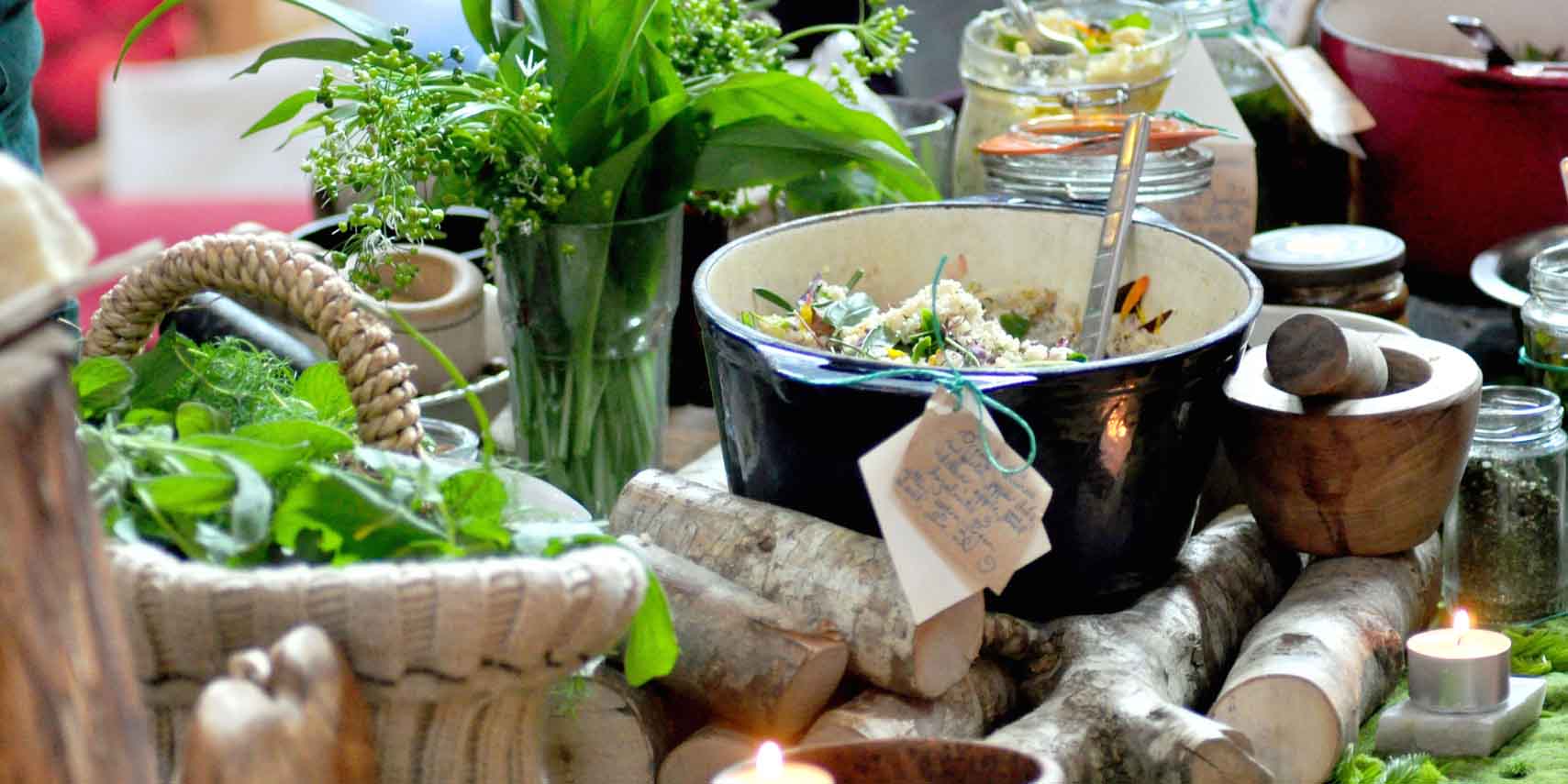

THOUGHT FOR FOOD
Charlotte Maberly on the new science of Gastronomy
Tell me what you eat, and I will tell you what you are – Brillat Savarin
Sapere aude (Dare to know) – Julian Baggini, from The Virtues of the Table: how to eat and think
 If a visitor from a bygone era were to be transported to a present day supermarket, they might understandably envy our apparent mastery of the food chain. They might wonder at the democratic availability of it all: be dazzled by pristine, sterile aisles and the alluring technicolour of perpetual variety. They might marvel at our triumph over the vagaries of nature and climate.
If a visitor from a bygone era were to be transported to a present day supermarket, they might understandably envy our apparent mastery of the food chain. They might wonder at the democratic availability of it all: be dazzled by pristine, sterile aisles and the alluring technicolour of perpetual variety. They might marvel at our triumph over the vagaries of nature and climate.
They might also be impressed by the efficiency with which we shoppers ‘forage’ in our modern environment. With a standard choice of over 10,000 items on the shelves, gathering from our contemporary larder demands a certain amount of savvy. The average supermarket shopper can make hundreds of decisions every time they select their sustenance, with an estimated 75% of their choices being made in store. So if we are not to be overwhelmed at the first litany of BOGOF’s – that is ‘buy one, get one free!’ – we have to have our wits about us.
Our time-travelling friend might justifiably assume that extensive training for this important task was delivered in early childhood or at school. But in fact, far from receiving any kind of proper education, we obtain our guidance from a myriad of different information sources throughout our eating lives. From definitive nutritional guidelines (traffic-light systems and the Eat Well Plate) to international certifications assuring authenticity (PGI, PDO, etc.), and from alluring health and lifestyle claims on packets to celebrity endorsements – our average shopping experience is awash with communications informing us about our food.
Even before we cross the threshold of our favoured multiple retailer, we have already been subjected to a capricious stream of advice telling us to be wary of some foods and to embrace others. Our various screens convey messages on the latest nutritional studies from the government as well as the tabloids, and bring us instruction from celebrity food experts such as Mary Berry, Jamie Oliver and Nigella Lawson on what we really should be eating right now. This accumulated wealth of food-related information becomes a cacophony, creating a modern-day omnivores dilemma; we may have a veritable cornucopia of foodstuffs available to us, but we are growing increasingly unsure of what is best to eat.

Confusing images on the supermarket shelves. Photograph by Charlotte Maberly.
It seems that this overwhelming barrage of information might actually be encouraging us to opt out of the difficult process of choosing our food altogether. There are now an increasing number of companies eager to alleviate the mental and physical burden of food-work by delivering pre-made, semi-prepared or raw ingredients right into our homes. Even the once dystopian fantasy of a meal replacement pill has been made real – a relief for those who want to eschew the burden of having to spend time on daily sustenance, and somewhat worrying for those who see the act of preparing and eating food as time well spent.
Further, although people in the UK today are in principle some of the most informed eaters that history has known, the statistics on declining cooking skills and dietary-related ill health would suggest otherwise. In 2014, 58% of women, 65% of men, and 1in 5 children entering into reception class, were considered to be overweight. It appears that the great wealth of information available to us is not being adequately digested, and we need a way of engaging with the world of food and food media that will translate into an ability to feed ourselves well and pleasurably.
But how can we do this when the predominant discourse tells us that food-work can be undertaken with little effort or thought? Convenience foods and feeding structures, plummeting food prices and special offers, all seem to be indicating that eating and cooking are things to be done quickly and for as little money as possible.
In this context, the ‘foodie’ and clean eating discourse upheld by Deliciously Ella, the Hemsley’s, and countless other social media and TV food personalities, seduces us with prolific blueprints for a sustainable, decorously indulgent, home grown, healthy, impeccably Instagrammed lifestyle which is also… oh yes, practically unattainable and makes us feel worse about what we are actually eating.
However, a growing number of food thinkers believe that the answer lies not in consuming more ideas, but in cultivating our own thought for food. Real food education, they argue, is not a luxury for foodies and chefs, but an essential human activity. Real food education is something that can, and should, happen everywhere for everyone at every stage of life, because there are few other things we do every single day which have such far-reaching consequences and in which we are all so entirely co-invested.
The New Science of Gastronomy
In his renowned 1825 text, The Physiology of Taste, the ‘Godfather of Gastronomy’ Jean Anthelme Brillat-Savarin reflected on the universal importance of food:
“The pleasure of the table belongs to all ages, to all conditions, to all countries, and to all areas; it mingles with all other pleasures, and remains at last to console us for their departure.”
Arguing for its cultural impact, he maintained that: “The discovery of a new dish confers more happiness on humanity than the discovery of a new star”. Brillat-Savarin was the first to articulate the need for a school entirely dedicated to the study of food. This would not be a school for chefs, he explained, but would engage students of all backgrounds in food education with a breadth and academic rigour unheard of at the time.
 A hundred and fifty years later, Carlo Petrini founded the Slow Food Movement when he made a public objection to the opening of a McDonalds at the foot of the Spanish Steps in Rome. His campaign voiced a widespread concern that the ‘McDonaldization’ of food would eradicate culinary diversity and therefore the associated cultural and biological diversity that make our world vibrant and viable.
A hundred and fifty years later, Carlo Petrini founded the Slow Food Movement when he made a public objection to the opening of a McDonalds at the foot of the Spanish Steps in Rome. His campaign voiced a widespread concern that the ‘McDonaldization’ of food would eradicate culinary diversity and therefore the associated cultural and biological diversity that make our world vibrant and viable.
Since then, the organisation has grown into a complex, grass-roots Movement which has flourished around the world, operating across 150 countries. It has created some of the world’s most notable food-centred events – such as the annual Terra Madre day when celebrations are held simultaneously in many different countries. It also supports projects to address food sovereignty and protect biodiversity, such as the creation of seed banks to preserve traditional crops. The Slow Food movement has become a vast network of producers, chefs, journalists, activists and eaters, all concerned with the universal right to ‘good, clean, fair food’.
In 2004, in one its most ambitious projects, the organisation established the University of Gastronomic Sciences (UniSG) in a small town in northern Italy. Students of the university study much in the mode envisaged by Brillat-Savarin, looking at the inter-relationship between food and environment, economics, politics, aesthetics, science and production.
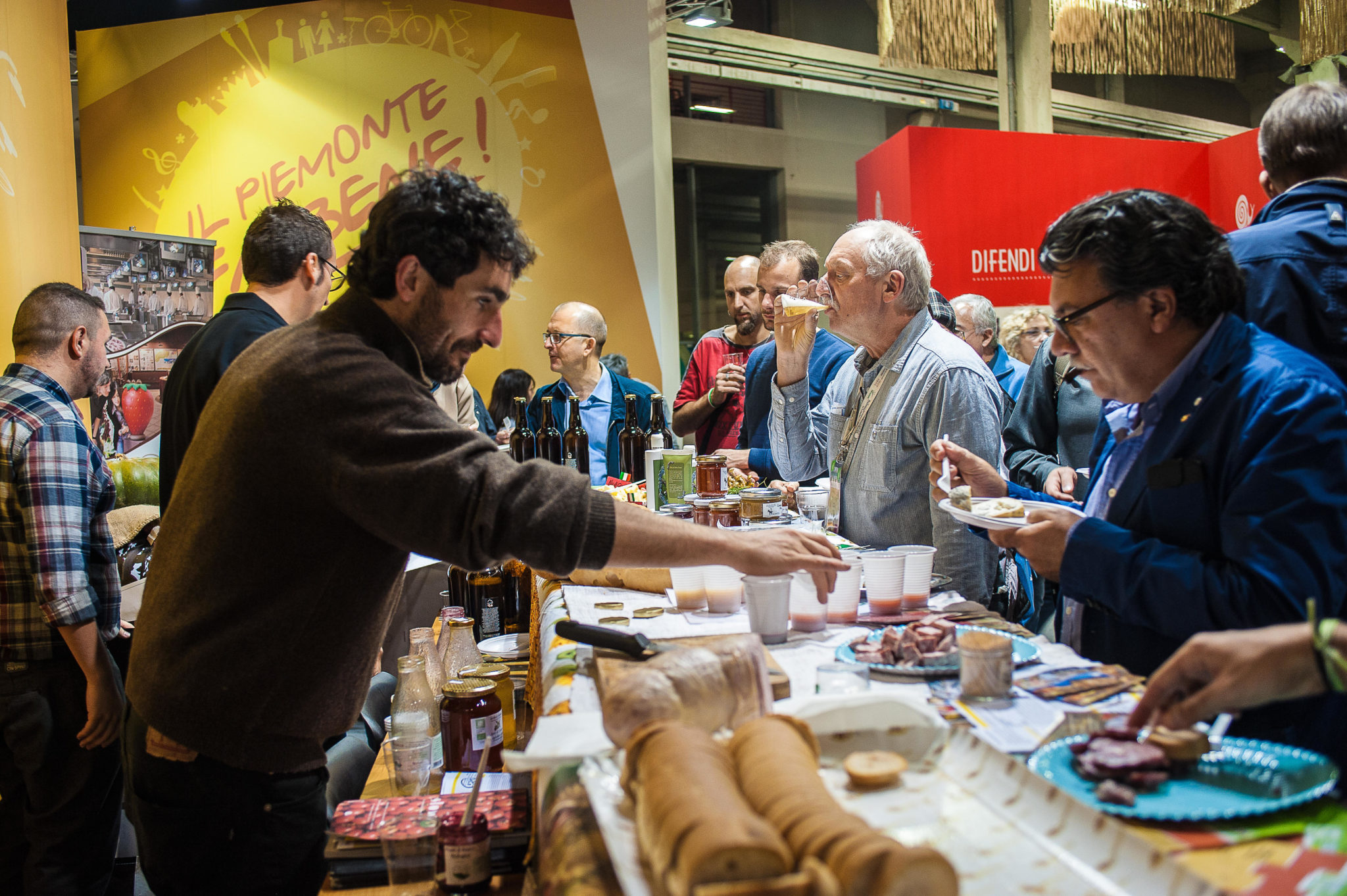
Piedmont Salone de Gusto and Terra Madre, 2014. Alamy Stock Photo.
The central philosophy of the Slow Food Movement rests in the understanding that food has a significance that reaches far beyond the plate, and which concerns every person. Petrini advocates that every eater should defend their “right to pleasure”, and he is sometimes misunderstood as a hedonist. But his prolific writings and speeches leave no ambiguity that true pleasure is only possible with real knowledge of what we are eating. Without any understanding of the places, people, history and culture that produce what we eat, food becomes anonymous – capable of stimulating our taste buds, but not our mind, emotions or soul.
Brillat-Savarin’s notion of ‘gastronomy’ correlates with this; it is ‘the understanding of all that nourishes mankind’. The etymology of the word indicates something equally broad; “the art or law of governing the stomach” – a definition far from the narrow scope most commonly ascribed today, where gastronomy is concerned only with the consumption and appreciation of luxury food items.
The philosopher, Immanuel Kant, held the opinion that to avoid exerting agency in our food choices is to practise infantilism. He, and many other thinkers, point to the fact that every mouthful of food has an impact, not only on our own person, but upon the natural world from where it came, on the people who grew, transported, traded, packaged and sold it, and far, far beyond that into the realm of politics, economics, ethics and metaphysics. These are matters with which, to his mind, the responsible human must be engaged.
And, as one of the only things in our existence that crosses the barrier between the external and the internal, the act of eating food can be seen as truly profound. Every time we eat, we are taking both the tangible and cultural world into our selves and choosing for it to become us – quite literally, we are incorporating it. But the significance of this is often lost as feeding becomes a mundane, even thoughtless, act.
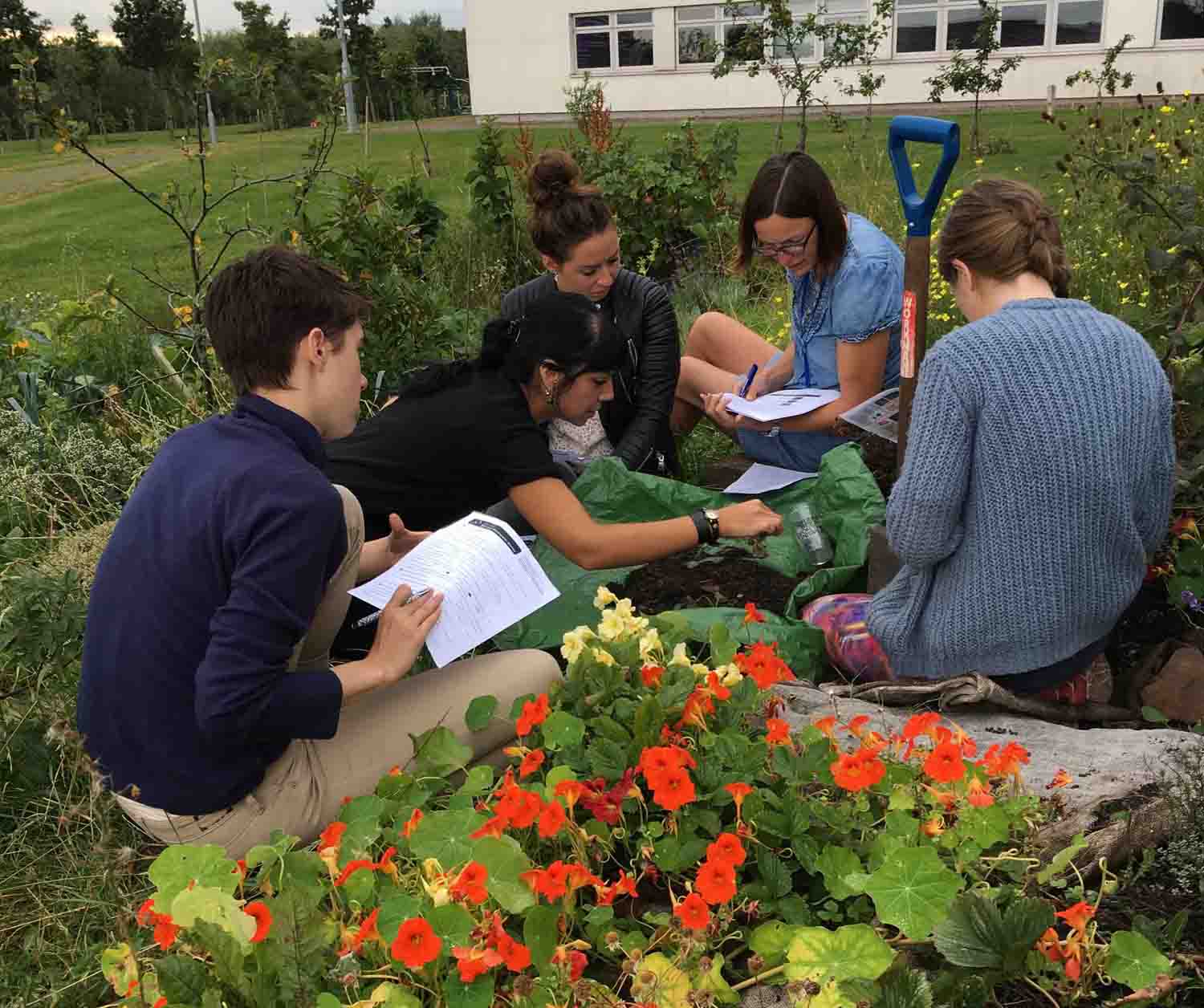
Students of Gastronomy at St Margaret’s University, Edinburgh investigate the qualities of soil. Photograph by Charlotte Maberly
Revaluing Food Education
Historically, food has seldom been considered a subject worthy of academic pursuit. Food was women’s concern, studied only by those who did not make the grade in more valued subjects. Even today in the UK, those who are struggling with the educational system are often encouraged to go into hospitality or kitchens.
From primary school through to higher education, food is typically presented as an issue of health and safety, nutrition, commerce and trade, or, sometimes, the natural world, but rarely is it considered as being all of these things together – and more besides. This reductionist perception is replicated in the world beyond the school gates, where food-work is remarkably unvaried, undervalued and poorly paid, and the siloed approach to understanding food creates a frustrating and damaging disconnect between eaters and producers, policy makers and communities, health care practitioners and farmers.
This disconnect is also evident in the nature of our food system, where we can no longer see where food comes from, nor where it goes to after it leaves our homes as waste. We have little sense of our impact on those who produce our food, or upon the ecosystems that bear the burden of our consumption. But most significantly, these things feel as if they are beyond our realm of influence. Food becomes the job of nutritionists, chefs, doctors, farmers, supermarkets, scientists and ‘experts’ – but not us.
According to Carlo Petrini, the wider impact of our consumption habits are made invisible to us, making such matters as how they impact upon our food seem relatively unimportant. But this only works to the advantage of the big industry that benefits from our current consumption levels. He advocates that in fact food needs to be the first consideration at policy level, maintaining that if we get food ‘right’, solutions to the majority of our current global crises will follow. A starting point for this shift in thinking would be to reject the title ‘consumer’, which implies we are passive, unthinking entities. Instead, Slow Food has coined the term ‘co-producer’ to underline the influence and participation required of the eater.
If we are to be co-producers, we will have to take thought for food more seriously. This means placing food at the centre of education, rather than it being considered an optional or frivolous topic. And it is encouraging to see that a growing number of institutions and organisations, including UniSG, are working to do just that.
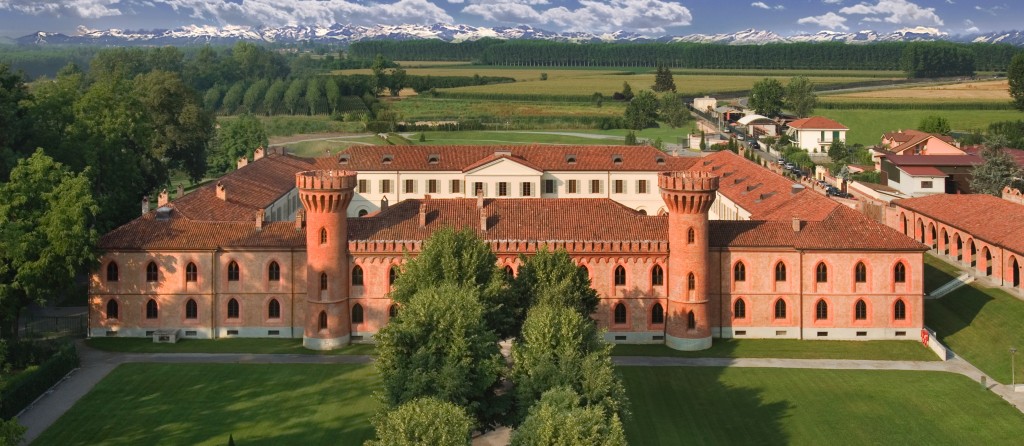
University of Gastronomic Sciences, Piedmont, Italy
Gastronomy in Practice
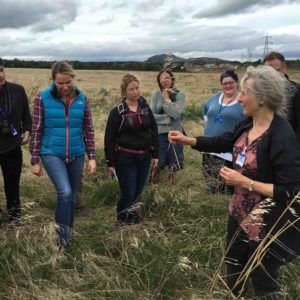 While UniSG is still the most renowned location, several universities such as SOAS in London, Queen Margaret University in Scotland, Boston University and others in Australia and Norway, offer interdisciplinary food studies that are attempting to subvert the convention. In addition, there are countless cookery schools and other innovative food spaces encouraging people to engage with food well beyond the plate.
While UniSG is still the most renowned location, several universities such as SOAS in London, Queen Margaret University in Scotland, Boston University and others in Australia and Norway, offer interdisciplinary food studies that are attempting to subvert the convention. In addition, there are countless cookery schools and other innovative food spaces encouraging people to engage with food well beyond the plate.
Food’s power to unite or differentiate people, its role as our direct connection to the natural world, and its potential to provide insight into the economic and political machinations of nations, all mean that it is an undeniably excellent tool through which to study the world. Although there is currently no textbook for gastronomy (it is questionable whether there should or could be one), curricula and approaches are currently being developed at the institutions mentioned.
The MSc in Gastronomy at Queen Margaret University considers there to be four essential ‘pillars of gastronomy’. Though they are studied as distinct modules, they cannot be studied separately and, in practice, consistently inform and relate to one another. All modules combine theoretical, practical, and metaphysical teaching and learning.
The first explores the relationship between food, people and place, investigating the concept of food culture via anthropology, ethnobiology, sociology and history.
The second looks at the science informing our treatment of soil, plants and ecosystems, how food transformation and preservation methods work, and how the scientific understanding of physiology and nutrition determines how we treat our bodies and what we eat.
The third pillar critically analyses the political, economic, geographical and social dynamics that impact the journey of food from pre-production to consumption and waste.
The final module draws on all other areas of the programme to consider how the idea of food is both created and consumed, touching on subjects such as philosophy and semiotics. Students come to question how the rapidly developing world of contemporary communications is impacting our understanding of what we eat, and how a more holistic notion of food might be cultivated.
Those who study gastronomy come from diverse backgrounds and areas of work, which brings a valuable range of perspectives to the classroom. Mostly, they wish to study gastronomy because they find food compelling and intriguing beyond its ability to stimulate pleasure on the tongue or fill the belly. Perhaps they have recognised that there is more to eating and cooking than is commonly portrayed, and are hoping to learn how to bring greater richness to the work they do with food.
While studying gastronomy, they engage with academic theory and current research; they hear directly from professionals across the food industry; they visit farms, factories, landscapes, processing facilities and restaurants; they make, taste, consider and explore food. Being exposed to such a broad range of subjects and experiences means the gastronomist or gastronome is not expected to become an expert. Instead they are asked to cultivate an awareness of, and tolerance for, complexity. This in turn allows them to respect the polysemia and far-reaching nature of food in whatever they do.
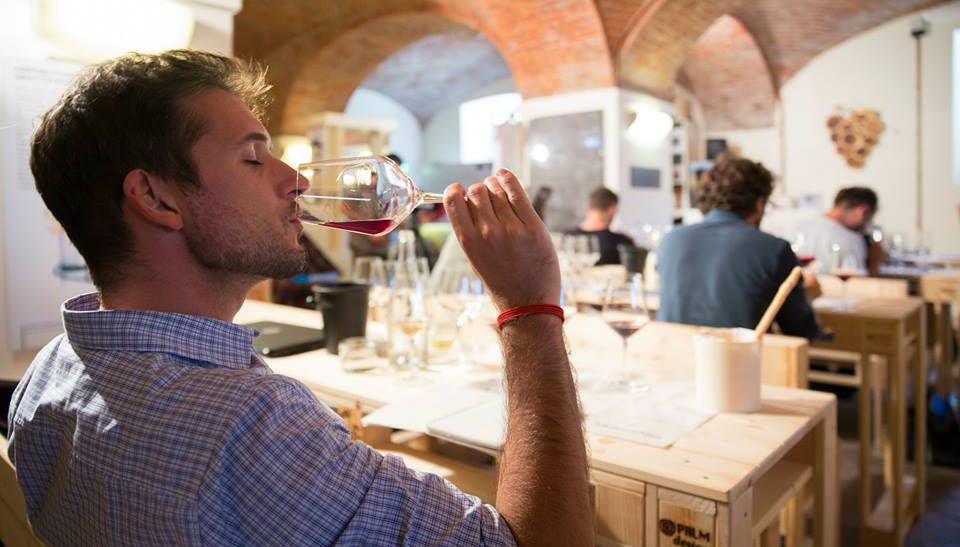
Students at the University of Gastronomic Sciences, Piedmont, Italy
The fact that eating is a universal necessity that can also bring pleasure and beauty into our lives means that it provides us with an extraordinary invitation to consider and deeply connect with the physical and metaphysical world around us. No matter how simple the food we choose, its meaning is great, and its significance is available to anyone who eats. Although understanding does not necessarily come automatically from eating, food is nevertheless the perfect teaching tool for learning about a more integrated approach to the world.
It is important to understand that gastronomic education, unlike the advice of ‘health experts’, is not prescriptive, telling us what we should eat or buy, or how to farm, because appropriate practices in these realms will vary with time, location and circumstance. Essentially, it cultivates awareness and an ability to critically engage with the world through what we eat. At all times, food holds histories; it gives us the opportunity to gain insight into the present, and a very real connection to our surrounding environments as well as to distant communities. As long as we are compelled to eat food (which should be for a while, unless we all get hooked on the somewhat onomatopoeic ‘Huel’), the world beyond our plate is available for us to think in every bite.
NEVER MISS AN ARTICLE
Please follow and like us:
CATEGORIES
Email this page to a friend
Email this page to a friend
Image Sources
Banner: courtesy of the Burren Slow Food Festival, which will be held May 14th–17th 2017 in Lisdoonvarna, County Clare.
First Inset Image: Students of Gastronomy at St Margaret’s University, Edinburgh, investigate the modern food industry. Photograph by Charlotte Maberly
Second Inset Image: Carlo Petrini, Founder of the Slow Food Movement
Third Inset Image: Students of Gastronomy at St Margaret’s University, Edinburgh, learn about foraging. Photograph by Charlotte Maberly.
Other Sources (click to view)
Jean Anthelme Brillat-Savarin, The Physiology of Taste: Or Meditations on Transcendental Gastronomy, translated by M. F. K. Fisher (First edition 1949, new edition with a forward by Bill Buford, Vintage Books, New York, 2009).
Julian Baggini, from The Virtues of the Table: how to eat and think (Granta Books, 2014).
Carlo Petrini, Slow Food Nation (Rizzoli, 2007).
 Charlotte Maberly is a food educator and currently manages the UK’s first MSc Gastronomy, which she also co-created. Gastronomy is the interdisciplinary study of food culture, science, systems and communications. www.QMUGastronomy.com
Charlotte Maberly is a food educator and currently manages the UK’s first MSc Gastronomy, which she also co-created. Gastronomy is the interdisciplinary study of food culture, science, systems and communications. www.QMUGastronomy.com
Charlotte has followed her love of food around the world working in a variety of food-related roles and studying her masters in Food Culture and Communications at the University of Gastronomic Sciences in Italy (www.unisg.it).
NEVER MISS AN ARTICLE
If you enjoyed reading this article, please leave a comment below.
Please also consider making a donation to support the work of Beshara Magazine. The magazine relies entirely on voluntary support. Donations received through this website go towards editorial expenses, eg. image rights, travel expenses, and website maintenance and development costs.
Please follow and like us:
READ MORE IN BESHARA MAGAZINE:




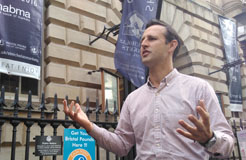
What an inspiring article! It would seem that “cultivating our own thoughts about food” as opposed to “consuming ever more information about food” would bring about fundamental change where it’s sorely needed, first and foremost agriculture.
Indeed it would, Heidi! It’s a long and complex road ahead to a better food future, but its certainly a worthwhile and necessary journey.
Thanks for appreciating the article!
It is a great pleasure for sharing your wonderful article. Thanks.
The way you put together the information on your posts is commendable. I would highly recommend this site. You might also want to check my page 48U for some noteworthy inputs about Airport Transfer.